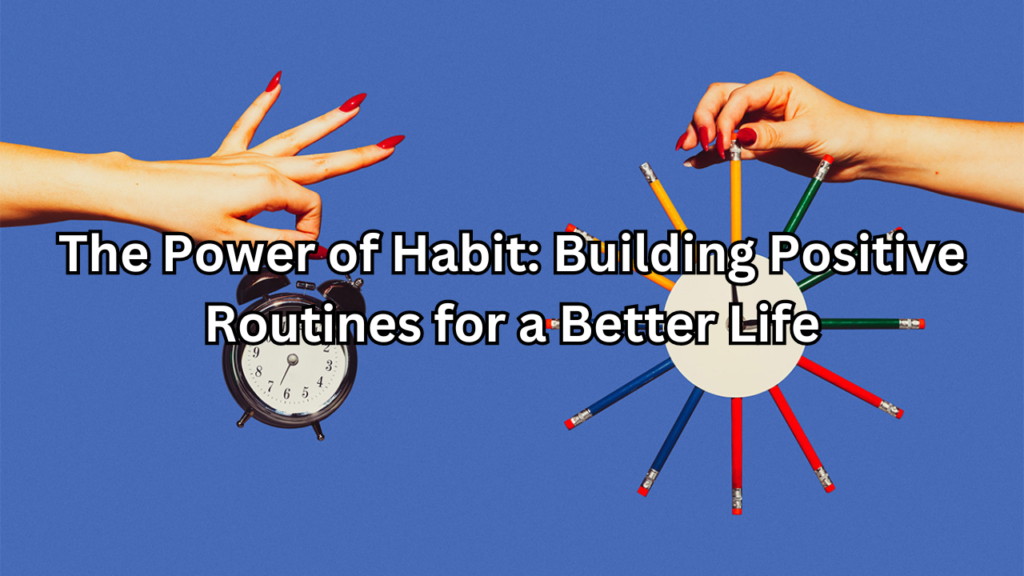
Table of Contents
In our fast-paced world, where demands on our time and energy are ever-increasing, the quest for a better life often leads us to focus on big changes and dramatic transformations. However, research suggests that real and lasting improvement often comes from a more subtle yet profoundly effective source: our habits. The power of habit is a key factor in building positive routines that can enhance various aspects of our lives.
Understanding Power of Habit
Habits are the behaviors we perform automatically, without much conscious thought. They form as a result of repetitive actions and are deeply ingrained in our neural pathways. According to Charles Duhigg, author of “The Power of Habit,” habits consist of a three-part loop: cue, routine, and reward. The cue triggers the behavior, the routine is the behavior itself, and the reward is the benefit we gain from completing the behavior. Over time, this loop becomes more efficient, making the habit more automatic.
The Science Behind Habit Formation
Neuroscience provides insight into why habits are so powerful. When a behavior becomes a habit, the brain essentially goes into autopilot mode, freeing up cognitive resources for other tasks. This is why habits can be both beneficial and detrimental. For instance, brushing your teeth is a positive habit that contributes to oral health, while biting your nails is a negative habit that can lead to unsightly and sometimes painful results.
Building Positive Habits
To leverage the power of habits for a better lifestyle, it is essential to focus on creating positive routines. Here’s a step-by-step guide to help you build and maintain positive habits:
- Identify the Habit You Want to Build: Start by choosing a specific and realistic habit you want to develop. For instance, if your goal is to improve physical fitness, consider incorporating a 30-minute exercise routine into your daily schedule.
- Find a Cue: Establish a clear cue that will trigger your new habit. Cues can be time-based (e.g., exercising every morning at 7 a.m.), location-based (e.g., doing yoga in your living room), or event-based (e.g., exercising right after work).
- Design a Routine: Develop a routine that you can easily incorporate into your daily life. Ensure that the routine is simple and achievable to avoid feelings of overwhelm.
- Choose a Reward: Select a reward that will reinforce the positive behavior. This could be something as simple as enjoying a piece of dark chocolate after a workout or taking a relaxing bath after completing your exercise.
- Be Consistent: Consistency is key to habit formation. Aim to perform the habit at the same time and in the same context every day to help solidify the routine.
- Track Your Progress: Keep a record of your progress to stay motivated. Tracking helps you see how far you’ve come and can provide a sense of accomplishment that reinforces the habit.
- Adjust as Needed: Be flexible and willing to adjust your approach if you encounter obstacles. Habit formation can be a trial-and-error process, so don’t be discouraged by setbacks.
The Impact of Positive Habits
The benefits of building positive habits extend beyond the immediate rewards. Positive habits can lead to improved physical health, enhanced mental well-being, increased productivity, and a greater sense of fulfillment.
- Improved Physical Health: Regular exercise, balanced nutrition, and adequate sleep are all habits that contribute to better health. For example, incorporating a daily workout routine can lead to increased energy levels, improved cardiovascular health, and enhanced mood.
- Enhanced Mental Well-Being: Positive habits such as mindfulness meditation, journaling, and regular social interactions can boost mental health. These habits help reduce stress, improve focus, and foster a more positive outlook on life.
- Increased Productivity: Habits like setting daily goals, prioritizing tasks, and managing time effectively can enhance productivity. By automating these routines, you can streamline your workflow and achieve more with less effort.
- Greater Fulfillment: Engaging in habits that align with your values and passions can lead to a greater sense of fulfillment. Whether it’s pursuing a hobby, volunteering, or spending quality time with loved ones, positive habits contribute to a more meaningful and satisfying life.
Overcoming Challenges
Building positive habits is not without its challenges. Common obstacles include lack of motivation, time constraints, and the temptation to revert to old behaviors. To overcome these challenges, consider the following strategies:
- Start Small: Begin with small, manageable changes to avoid feeling overwhelmed. Gradually build on these small successes to create more significant habits.
- Stay Accountable: Share your goals with a friend or join a support group to stay accountable. Having someone to encourage you and celebrate your progress can make a significant difference.
- Cultivate Resilience: Understand that setbacks are a natural part of the process. Instead of being discouraged, use them as opportunities to learn and adjust your approach.
- Focus on the Benefits: Remind yourself of the benefits associated with the new habit. Visualizing the positive outcomes can help maintain motivation and commitment.
Conclusion
The power of habit is a profound tool for building positive routines that can lead to a better life. By understanding how habits work and following a strategic approach to habit formation, you can create lasting changes that enhance your physical health, mental well-being, productivity, and overall fulfillment. Embrace the power of habit, and you’ll discover that the path to a better life often begins with the small, consistent steps of positive routine building.
